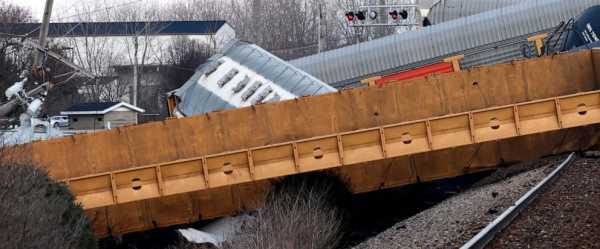
ATLANTA — Federal regulators want first responders to a train derailment to know exactly what they are dealing with even before they reach the scene, because the dangerous chemicals trains carry might require a specialized response.
So the Pipelines and Hazardous Materials Safety Administration proposed a new rule Wednesday that would require all railroads to immediately send the details of everything aboard their trains to every emergency responder within 10 miles, as soon as the railroad becomes aware of an accident.
The new rule comes one day ahead of a National Transportation Safety Board hearing to scrutinize emergency responses to the fiery Feb. 3 derailment of a Norfolk Southern train outside East Palestine, Ohio. The NTSB is still working to determine exactly what caused that wreck, which prompted the evacuation of thousands of people and ignited nationwide concern about railroad safety and calls for reforms.
The largest freight railroads already have an app they developed, AskRail, which for nearly a decade has enabled firefighters to quickly look up the details of what each train carries. Some 35,000 first responders already have access to that app, and the rail industry is working to expand that. And crews have long carried printed copies of their cargo in the cabs of their locomotives.
And railroads should already know who to push that information to electronically — dispatchers and rail police are expected to maintain contacts for first responders all along their routes, to reach out to whenever there is a crossing accident, a trespasser or any other issue.
But this proposed rule would apply to every railroad that carries chemicals — not just the six biggest ones that created AskRail. Nearly 600 railroads would be covered. And the rule would force the railroads to proactively send out this information to all nearby emergency services, using electronic push alerts, anytime there is a derailment or hazardous chemical release, instead of expecting arriving firefighters to look up the details on an app.
“On-demand access to key information about hazmat shipments coupled with proactive information sharing with those closest to the problem will enable first responders to better prepare for the risks present at the scene of an incident before they arrive on scene,” said Tristan Brown, deputy administrator of the agency.
The old standby of expecting train crews to provide cargo information at the scene has its limitations. Precious minutes can elapse in the chaos of a major derailment before first responders find crewmembers. But that would still be the backup plan in case first responders don't get the electronic information right away.
The Association of American Railroads trade group emphasizes that railroads remain the safest way to ship dangerous chemicals by land with more than 99 percent of those shipments arriving safety.
But even one derailment involving hazardous materials can prove disastrous, and last year there were more than 1,000 derailments — roughly three a day. More than three quarters happened at slow speeds in railyards, without causing major damage.
An AAR spokeswoman said railroads want to make sure “every first responder who arrives at the scene of a rail emergency has the right information to respond safely.” The industry plans to work with regulators to determine the best way to give first responders what they need while still protecting the security of sensitive information about the cargo railroads carry.
Since the East Palestine derailment, U.S. Transportation Secretary Pete Buttigieg and other regulators have pressed for changes, urging railroads to do more to prevent similar disasters and issuing advisories about various aspects of railroad operations.
Regulators said this proposed rule may not have changed the outcome of the derailment in East Palestine, but that accident and others show how important it is to provide emergency responders with timely, complete and accurate information.
Volunteer firefighters were first on the scene of the East Palestine derailment, and Ohio officials said they handled it about as well as they could under the circumstances, but Gov. Mike DeWine has pushed the railroads to disclose more information ahead of time to states and communities about the chemicals they carry.
"We applaud the DOT for prioritizing fire fighter and public safety,” said Edward A. Kelly, who leads the International Association of Fire Fighters.
Sourse: abcnews.go.com






